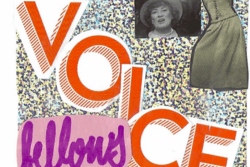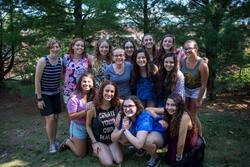To My Fellow RVF Fellows
Content warning: This piece briefly discusses suicide. If you or someone you knows needs help, call or text 988 to reach the 988 Suicide and Crisis Lifeline or go to SpeakingOfSuicide.com/resources for a list of additional resources.
Dear Fellow 2022-23 Rising Voices Fellows,
As we end our fellowship together, I want to use my last blog post as a letter to you and the people at the Jewish Women’s Archive who made it all possible. But first I want to start with a story of a girl like us.
In 2010, Phoebe Prince was a precocious and, by all accounts, pretty fifteen-year-old girl who moved from Ireland to a suburb outside of Boston with her family. She was immediately popular in school and achieved that stereotypically American stamp of high school success (at least as depicted on TV and in movies): she dated the quarterback of the football team. But because at some point she irritated a group of popular girls in the school, they started to tease her, and others followed suit. It became a pattern.
I'll let the Boston Globe's January 24, 2010 article finish the story: “Ten days ago, Phoebe was walking home from school when one of the Mean Girls drove by in a car. An insult and an energy drink can came flying out the car window in Phoebe’s direction. Phoebe kept walking, past the abuse, past the can, past the white picket fence, into her house. Then she [took her own life]. Her 12-year-old sister found her.”
On the surface, our Rising Voices Fellowship has been about Jewish feminism, thought, and writing. But, to me, it feels like it was about more than that. It was about the power of words. I learned how words can be used to express deep thoughts and to do tremendous good. We should also be mindful of the harm they can do. We all know this intrinsically and from our own experiences. So did Phoebe Prince. Words are power, and we need to wield that power thoughtfully.
I saw us do this well in our writing and in our discussion on the retreats, coincidentally also in Boston. We certainly did not always agree, but we listened and we used our words to express our distinct points of view. So many of your blog posts touched me, too many to list here. I loved Miriam’s discussion of how ancient practices, like shmita, can carry meaning today. I was moved to reconsider how I feel about prayer services by Sonia’s explanation of how she found meaning in her camp’s services. And I found myself mesmerized by Rosie’s carefully constructed evocation of how she learned to personalize religious practices from her mother after her divorce. To name just a few.
Our generation can do better than the ones before it. I hope we can use our writing and words to do or encourage good, to stand with people who may be unpopular or disenfranchised—sometimes people we may not even like, perhaps even for justifiable reasons—when we see they need support.
Society has done us a great disservice. I saw somewhere (although I can't now remember where), the idea that people our age are usually rewarded for being the best lemmings. To get into a good college or job often requires us to successfully check off predetermined boxes: enough extracurriculars, high enough grades or test scores, enough outwardly displayable examples of leadership. The result is that we have been programmed to figure out how to get things done, but not to ask whether they're worth doing in the first place. Women of our generation should aspire to change that. If something doesn't seem right, we need the moral courage to stand against it.
It’s on each of us. Sometimes it’s hard to act alone, so let’s work together. And if that fails, then we simply need to do it ourselves, whatever the cost.
If this sounds hard, remember that the groups we perceive ourselves belonging to are largely artificial anyways. As my fellow Fellows know, I spent part of our last retreat studying for the AP Psychology exam, so I consider myself something of an expert on the field now. The social psychology minimal group paradigm has demonstrated repeatedly that even exceedingly arbitrary differences between groups can cause a person to do things to favor their own group at others’ expense. Over and over, experiments have shown that people will help certain people and hurt others over the most inane, random differences, right up to and including the color of their shirts or their preference in art. My point is not that we don't have much in common with each other—we do—it’s that the people we may dislike or look down upon probably have far more in common with us than we care to admit.
Let’s be good to each other and use what we learned during our fellowship to help the causes of Jewish women everywhere. If we do that then we will, in all likelihood, do more good than bad. If we take care of each other, we can share positive experiences that are not only meaningful but hallowed, that are, to quote David Foster Wallace, “on fire with the same force that lit the stars - compassion, love, the subsurface unity of all things.”
Sincerely,
Aviva
This piece was written as part of JWA’s Rising Voices Fellowship.







